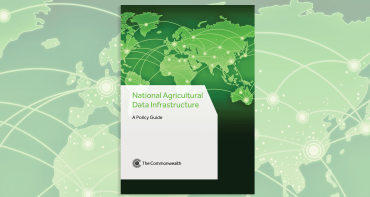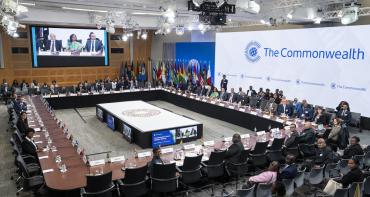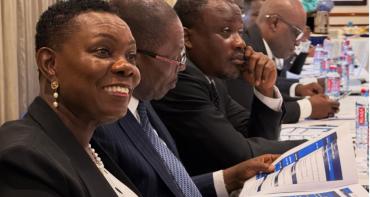Small, poor and vulnerable Commonwealth and Francophonie countries have ended a day-long outreach meeting with Mexico with a call to the G20 to support their efforts to promote food security and build green economies.
The meeting at the World Bank headquarters in Washington DC on 19 April brought together G20 Development Working Group representatives from Australia, Canada, France, India, South Africa and the United Kingdom, and senior officials from Africa, Caribbean and the Pacific that belong to the Commonwealth or the International Organisation of La Francophonie, which groups mainly French-speaking nations. Mexico, the G20 chair for 2012, attended.
Building on a similar event in Cape Town, South Africa, in 2011, the meeting provided an opportunity for several of the world’s poorest, smallest and most vulnerable countries to share with the G20 Chair and some of the G20 Development Working Group members their experiences in addressing their most pressing development challenges, as well as their perspectives on key actions needed to address them.
In a statement at the end of the meeting, participants welcomed Mexico’s intensive outreach efforts and encouraged a continued focus on food security and promoting green growth as important areas of emphasis during Mexico’s G20 presidency.
Participants noted that food insecurity and the challenges of building green growth and green economies ranked among the most urgent priorities in many of the poorest, smallest and most vulnerable countries of the Commonwealth and La Francophonie.
Emphasising evidence from across developing countries in the two associations, participants highlighted that “food insecurity can quickly erode resilience and exacerbate vulnerabilities in these countries, and hinder the countries’ abilities to maintain effective social safety nets, reduce poverty and achieve sustainable growth”.
They called for a cohesive set of measures to increase food production and access, including securing longer-term commitments for future investment, financial and technical assistance; adapting new research to better assist the poorest, smallest and most vulnerable developing countries; as well as developing tools to help increase productivity for small landholders and promoting long-term sustainable use of natural resource proceeds.
They noted that building green economies, green growth and sustainable development can provide resilience to external shocks, reduce environmental risks and protect and enhance the natural resource base of the economy.
Participants recognised that pursuing green growth and sustainable development matched the G20 objectives of generating new sources of jobs, particularly among the youth, increasing energy efficiency, promoting sustainable consumption and production and renewable energy supplies.
They also called on the international community, including the G20, to scale up investment in the natural resource base of developing countries, promote knowledge sharing on the experiences, practices and lessons learned to date in forging effective pathways to green growth and sustainable development and identify and secure viable financing options to support concrete actions, among others.
They said that building momentum to achieve these priorities will require increased international recognition and commitment during key global processes in 2012, such as the forthcoming G20 Los Cabos Summit, Mexico, the Rio+20 Conference – the United Nations Conference on Sustainable Development - and the United Nations Framework Convention on Climate Change process.
“We have urged that these processes be pursued with both a high level of ambition to support the development of climate resilient, lower-carbon economies in particularly vulnerable countries and strengthened efforts to bring the international community closer to an agreed and more joined-up approach to sustainable development in these countries.”



